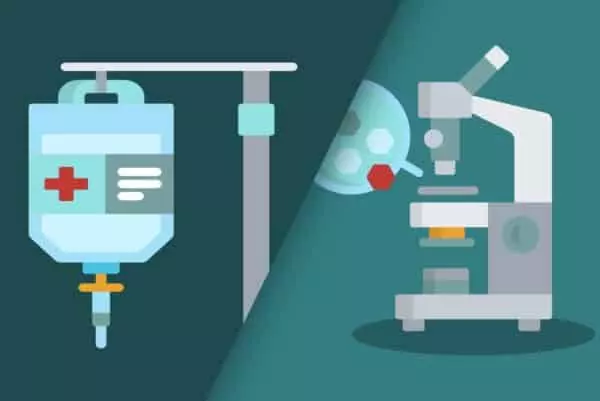
Immunotherapy and chemotherapy are both cancer treatments. The main difference between immunotherapy and chemotherapy is the way these treatments target cancer. Chemotherapy uses drugs to target and kill fast-growing cells. Immunotherapy uses the body’s immune system to slow, stop and kill cancerous cells.
What Is Immunotherapy?
Immunotherapy is a treatment that utilizes the body’s immune system to fight disease. Immunotherapy has become an increasingly popular treatment for aggressive cancers, such as mesothelioma.
Previously, it was only available through clinical trials. However, in recent years, forms of immunotherapy have become more widely available to patients. Some immunotherapy drugs have gained approval by the U.S. Food and Drug Administration (FDA) after showing positive results in testing.
Immunotherapy has shown success in targeting tumor growth and symptoms with mesothelioma, skin cancer, lung cancer, breast cancer and many other types of cancer.
In October 2020, the FDA approved the combination immunotherapy of Opdivo®️ and Yervoy®️ as a treatment for unresectable malignant pleural mesothelioma.
How Does Immunotherapy Work?
Immunotherapy treatment teaches the immune system to fight cancer. This can slow, stop or kill tumor cells. This type of cancer treatment is commonly used in combination with conventional treatments, such as surgery, chemotherapy and radiation therapy.
For certain cancers like mesothelioma, immunotherapy may be an option for patients that aren’t responding to standard treatment options.
Multiple types of immunotherapies can be used to fight cancer. These types are categorized as passive or active.
- Active therapies teach the immune system to fight the tumor in a way that may give the immune system memory. This may allow the immune system to continue fighting the cancer even after the treatment has stopped.
- Passive therapies use proteins that allow the body to attack and kill cancer cells. However, passive therapies do not provide immune system memory. Thus, the body will not continue fighting the cancer after the treatment has stopped.
What Is Chemotherapy?
Chemotherapy uses medication to target and destroy cancer cells. Chemotherapy drugs are toxic to cancer cells. Therefore, chemotherapy can slow cancer growth or kill tumors, reducing cancer symptoms.
There are many different chemotherapy drugs available. Chemotherapy can be used independently or in conjunction with other treatment options, which is referred to as multimodal treatment.
Chemotherapy is a standard treatment for pleural mesothelioma. Several clinical trials are currently testing chemotherapy in combination with other cancer treatments, including immunotherapy.
How Does Chemotherapy Work?
Chemotherapy drugs harm both cancer cells and healthy cells. However, cancer cells are more susceptible to chemotherapy damage than normal cells. Thus, chemotherapy damages and kills cancer cells more efficiently than it does healthy cells.
There are two types of chemotherapy. The two types differ in how they are administered and the common side effects experienced by patients.
- Systemic chemotherapy is administered by injection (intravenous) or in pill form. It travels through the bloodstream to target and kill cancerous cells.
- Intracavitary chemotherapy is applied directly to tumor formations, most commonly during surgery. Examples include intrapleural chemotherapy and heated intraperitoneal chemotherapy, also referred to as HIPEC. HIPEC is used to treat patients with peritoneal mesothelioma.
Systemic chemotherapy travels throughout the body, affecting more cells. Thus, patients tend to have more side effects with systemic chemotherapy than intracavitary.
Differences Between Immunotherapy and Chemotherapy
Chemotherapy and immunotherapy are both popular treatment options for cancer. Chemotherapy has been an established cancer treatment for years. Immunotherapy is not yet as widely adopted as chemotherapy. However, its success in clinical trials and recent FDA approval for a growing list of cancers show promise for adoption as a first-line treatment option.
Is Immunotherapy More Effective Than Chemotherapy?
In some cases, immunotherapy may work better for a patient than chemotherapy. There are a variety of influencing factors that determine the efficacy of different treatment methods, such as cancer type, staging and patient health.
For example, malignant pleural mesothelioma is an extremely aggressive cancer with a low life expectancy. Doctors commonly prescribe a multimodal treatment plan. Depending on the patient’s case, treatment may incorporate surgery, radiation and/or chemotherapy.
However, immunotherapy might be more effective for some patients than traditional mesothelioma treatment options. Immunotherapy drugs such as Keytruda® have successfully extended life expectancy for some mesothelioma patients in clinical trials.
Ultimately, the best treatment plan for a cancer patient varies. The best option is to talk to a medical professional. They will gather the patient’s health history, run a variety of tests and determine the best way to slow or stop the growth of cancer, while also addressing symptoms.




